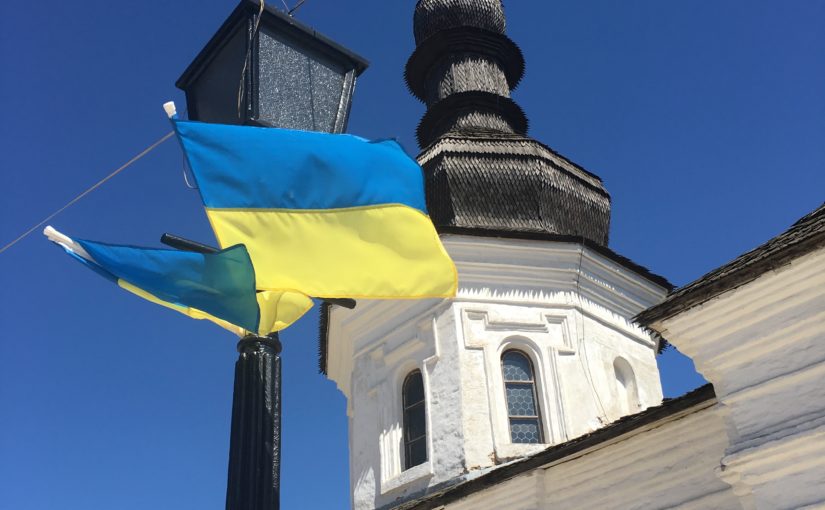It’s almost the end of week four. Friends have come and gone but the city is starting to feel like home. Walking past buildings I know and seeing familiar faces on the street, I no longer feel like I’m in survival mode all the time, constantly worrying I won’t be able to talk with or understand the people around me. Don’t get me wrong, there’s still a fair chance I won’t be able to understand anything someone says to me in a restaurant or on the street, but I’m not as worried about it anymore. First of all, I realized that, in many instances when I don’t understand a single thing someone says, it is because they are speaking in Ukrainian, not Russian (go figure). Secondly, if they are speaking very quickly in Russian, I can ask them to speak more slowly (пожалуйста, говорите немного медленнее) so I can understand them. Lastly, if they are both a) speaking Russian, and b) speaking slowly and I still don’t understand, I can repeat the words I didn’t know and ask what they mean (что это значит?). While I am in no way fluent, I feel as though I’m starting to gain the language skills to navigate a foreign country without panicking every time a waiter asks what I want to eat–I am somewhat ashamed to admit that until recently, when ordering at a restaurant, I would just point to the picture on the menu and say, можно? (May I?). In my defense, I usually go to restaurants for lunch, which is right after three and a half hours of Russian class and my brain can’t really function in Russian or English at that point.
However, I have recently had some good conversations with native Russian speakers, which has helped me feel more confident about my Russian speaking ability. For instance, I took a taxi home with some friends last night, and was able to talk to the taxi driver in Russian about why we are in Kiev, what we are studying, and how we like Ukraine. Although it was a simple conversation, it was a good feeling when I actually understood his questions and was able to reply with more words than just да or нет.
Last week, I was also able to have an hour and a half of class time alone with my teacher because some students had finished their program while new students hadn’t arrived yet. This was probably the best class day I’ve had so far. Normally, everyone prepares to talk about something they read in the news, but because I was the only student in class, I got to talk with my teacher for the entire first half of class. This was very important for me, because I was able to speak without the anxiety of making mistakes in front of other students, and my teacher could give me vocabulary without stopping our conversation so that I could express myself more clearly. I had chosen to talk about two football fans who were attacked in Russia during the World Cup, yet we ended up talking about homophobia and race relations in the US, and the role of education in poverty and vice versa.
These two positive interactions have reminded me that the purpose of language is to communicate and express yourself. Learning Russian has also taught me that some things aren’t directly translatable, such as patterns of speech and idioms. For example, when I work with my peer tutor, we have to do a lot of “talking around” words. He doesn’t speak English, so if he uses a word I don’t know, he has to explain the meaning to me in Russian. Something I have noticed in his speech pattern, as well as with my teacher, is that when he is trying to explain something to me, he begins his explanation with смотри (look) or допустим (let’s say), and then gives me an example or corrects my grammar. While we also use this phraseology in English in a similar context, it seems to be used more consistently in Russian to begin an explanation.
Other common phrases and responses I have learned:
- круто (cool)
- здорово (great, good)
- ладно (okay, all right)
- понятно (understood)
- почëм instead of сколько стоит? (how much does this cost?)
We also talk about a surprising number of idioms in class, which include but are not limited to:
- вот где собака закрыта (that’s where the shoe pinches, this is the crux of the matter)
- что-то сводить меня с ума (something drives me crazy)
- что-то отошли на задний план (something is on the back burner, not as important as other things at the moment)
- всë, что душе угодно (all that you please, everything your heart desires)
- вы как две капли воды (you are like two peas in a pod, two people who are very similar to each other)
While I look forward to going home in a week, I also wish I was spending the whole summer here in Kiev. Learning a new language is physically, mentally, and emotionally exhausting, but the feeling of communicating with another person in a different language is extremely rewarding. Or as my peer tutor would say, очень круто (very cool).
